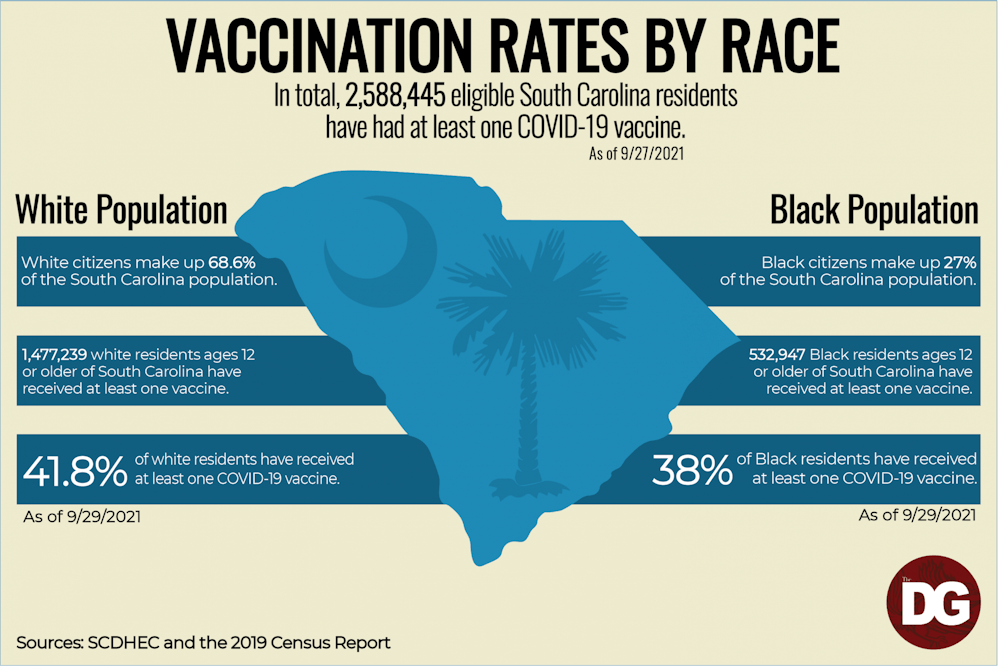The USC Prevention Research Center, a CDC-funded member of the Prevention Research Center (PRC) Network, has begun a year-long campaign aimed at increasing statewide vaccination rates in underserved populations.
The USC Prevention Research Center is a staple of campus and focuses primarily on applied public health that involves and benefits the community, according to Sara Wilcox, its director and an exercise science professor. The center has been continually funded since 1993.
“We do feel really honored to have had a center here for so long,” Wilcox said.
More recently, through the aid of a supplemental CDC grant of $500,000, the center has become a part of a national, collaborative network of fellow Prevention Research Centers: the Vaccine Confidence Network.
This network plans to increase vaccination rates in populations disproportionately affected by COVID-19 by partnering with community-based organizations and implementing behavioral interventions. USC’s specific vaccination project focuses on non-Hispanic, Black communities and neighborhoods in South Carolina.
Based on information from the South Carolina Department of Health and Environmental Control (SCDHEC) and the 2019 U.S. Census report, 38% of Black residents 12 or older have had at least one vaccine shot, compared to 41.8% of white residents 12 or older. In total, 2,588,445 eligible South Carolina residents have had at least one vaccine, according to SCDHEC data last updated Sept. 27.
“Aligned with the CDC’s main goals, we’re trying to identify the reasons and barriers for people’s acceptance of vaccination of COVID-19. Second, we’re trying to recruit and train the peer advocates and professional navigators, such as the community health workers, to share their experiences and promote the (acceptance) of the COVID vaccinations. Finally, we try to hold health communication campaigns, social marketing events, in African American neighborhoods," Shan Qiao, lead investigator of the new vaccination project, said.
Currently, the project's next steps are forming focus groups to gain a better understanding of socio-behavioral explanations of vaccine hesitancy and to understand what misinformation is currently being circulated in local communities, Qiao, an associate professor in health promotion, education and behavior, said.
“We're working with the South Carolina Community Health Worker Association ... to help us recruit the participants," Brooke McKeever, co-investigator of the new vaccination project, said. "They have a much bigger reach than we can here as researchers at University of South Carolina and they're on the ground helping people get vaccinated; answering questions."
Using the information gained from the focus groups, the project is than more equipped to combat specific barriers and misinformation currently being spread. From there, the project plans to recruit and train peer advocates and professional navigators through training workshops and materials, so that it is able to share accurate information within the communities.
“These community health workers — they're already trusted; they're already in the communities," McKeever, associate dean of research for the School of Journalism and Mass Communications, said. "That's why we wanted to work with them to help disseminate information and also just to help us figure out what's going on so we can target the misinformation, get good information out and get more people vaccinated."
By partnering with key stakeholders such as South Carolina Department of Health and Environmental Control and the South Carolina Community Health Worker Association, the PRC hopes to empower and equip these community organizations with the tools to help increase vaccination rates, according to Qiao.
Additional organizations the PRC has partnered with for this project are CAN Community Health Center and Palmetto AIDS Life Support Services.
While this is currently a one-year project Qiao said she is optimistic regarding the sustainability of this project and how these partnerships could help to lay the groundwork for future projects.
“This could go beyond the vaccination uptake. It could be focused on chronic disease, like cancer prevention, HIV prevention, of course, and other issues based on the needs of the local communities,” Qiao said.
Correction (Sept. 29, 2021, at 5:23 p.m.): The Daily Gamecock used an article by The State as a reference that 10% of white South Carolina residents and 5% of Black South Carolina residents had been vaccinated. That article was written in February, and the information was outdated. The Daily Gamecock has based new percentages off information from SCDHEC and the 2019 U.S. Census report and corrected the article and infographic accordingly.

